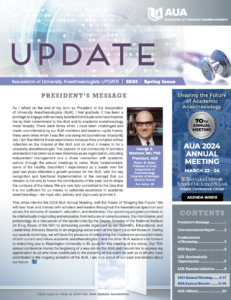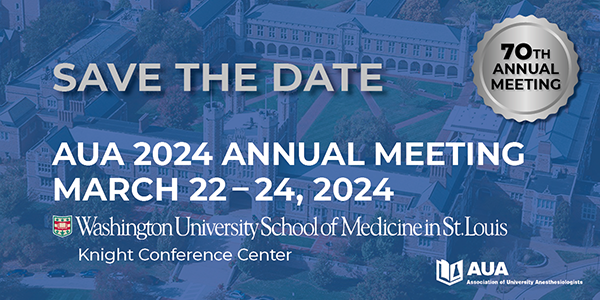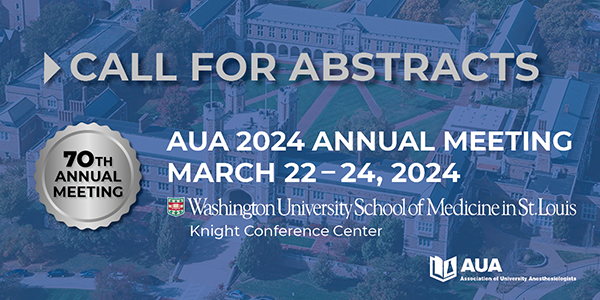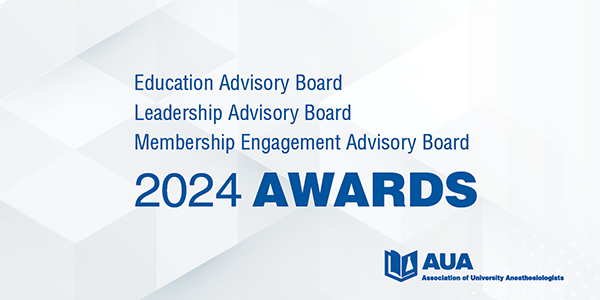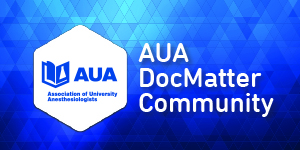President’s Message: Looking Back and Forward
The Association of University Anesthesiologists (AUA) had a momentous year of transition and promise. 2023 was marked by both the important decision to return to an independent organization and the work to actualize the process. Many people stepped up in remarkable ways to complete the transition to new society management. I would like to recognize the many efforts of our AUA leaders, team members from the International Anesthesia Research Society, notably Tom Cooper, and our wonderful colleague Vivian Abalama, who has been instrumental in helping us advance the mission of the AUA while also making this transition. I am pleased to announce that, as of December 2023, the Association Resource Center (or ARC) is our new association management company. ARC works with other important organizations in the field, such as the Society of Academic Associations of Anesthesiology & Perioperative Medicine and the Society for Education in Anesthesia, among many others. We look forward to their expert support and partnership moving forward.
2023 was also marked by the inauguration of the AUA Mentoring Program, with more than 100 AUA members volunteering to guide the next generation of academic anesthesiologists. The AUA represents the best and brightest in our field, which means there is a wealth of experience and wisdom amongst our members. As noted in the past, we have shifted from an almost exclusively honorific society to a more functional one because it is no longer sufficient merely to celebrate excellence in academic anesthesiology, we must also actively promote it. Mentorship of our Associate Members is an important part of that process. I would like to thank our AUA mentorship task force for guiding us through this process, Vivian Abalama for her support, the many senior faculty anesthesiologists who signed up to be mentors, and the AUA mentees who have engaged in the process.
In 2023, the AUA took an important next step in addressing sexual harassment in academic anesthesiology. As you might recall, the Association of American Medical Colleges (AAMC) published a report in 2022 identifying academic anesthesiology, among a total of 27 clinical and basic science disciplines, as the worst field for gender-based harassment. However, the AAMC report lacked critical data for understanding and addressing this systemic and unacceptable problem. Through the outstanding efforts of Dr. Maya Hastie and the AUA Leadership Advisory Board, in partnership with the British Medical Association, we gathered and analyzed data from the U.S. and Canada to give us a more complete picture of the problem so we can act accordingly. The quantitative and qualitative data will be submitted for publication, with the intent of developing recommendations that can be implemented in academic anesthesiology departments. There is a long road ahead, including expanding the scope of these efforts, but the work of Dr. Hastie and the Leadership Advisory Board paves the way for important new directions. I thank them sincerely for their efforts.
Looking forward to 2024, I am excited by the start of the first year of the AUA as an independent organization in more than a decade and a fantastic annual meeting—our 70th, in fact!—at Washington University in St. Louis. This exceptional institution is a perfect setting for the transition to our new AUA President, Dr. Dolores Njoku, who serves as Vice Chair and Professor in the Department of Anesthesiology at Washington University School of Medicine. Dr. Njoku is passionate about advancing academic anesthesiology, has served as a leader in the field in many ways, and will no doubt be an outstanding and highly effective AUA President. I would also like to thank Dr. Njoku, Dr. Michael Avidan (Chair), and the rest of the team in the Department of Anesthesiology at the Washington University School of Medicine for their work in hosting this annual meeting. The conference will be a true meeting of the minds in academic anesthesiology.
As I look ahead to the end of my term as President, I would like to express my gratitude to all our AUA members, AUA Executive Officers, AUA Council members, AUA Boards, and our dedicated colleague Vivian Abalama. It has been a privilege to serve at the helm of the premier elected society in our field and I am optimistic about the future of the AUA and the positive impact it is positioned to create for anesthesiology and, ultimately, medicine, science, and society.

